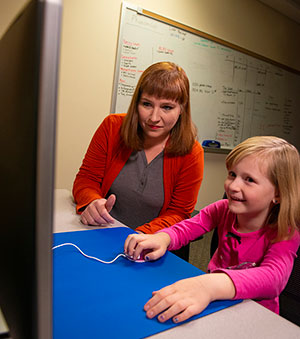UW Division of Communication Disorders Researches Speech Sound Issues in Children
Published December 15, 2020

A grant from the American Speech-Language-Hearing Foundation will support research through the University of Wyoming Division of Communication Disorders aimed at helping children who struggle with speech sound disorders (SSD), a condition that limits a child’s ability to learn and communicate new words and speech sounds.
Breanna Krueger, an assistant professor with the UW Division of Communication Disorders, will lead the study, titled “Interpretation of Misarticulated Words by Children with Speech Sound Disorders.”
“Children learn new words and speech sounds through hearing others in their communicative environments. This process is known as incidental learning,” Krueger says. “It is well established that children develop early representations of sounds of their first language, and use these representations to segment and understand the words they hear.”
This segmentation is stored in the child’s mental lexicon to be saved for later use. However, children with SSD may struggle with forming those early representations, which impacts their speech production as well as their learning of novel words. This difficulty may limit the ability of these children to integrate nonexemplar productions of words, such as other accents, dialects or, more frequently, developmental misarticulations by peers. The purpose of the proposed study is to explore word identification of misarticulated words by children with SSD.
Using MouseTracker software, 20 English-speaking preschoolers aged 4-5 will be assessed for language, phonological processing and articulation skills. Then, participants will hear different types of words: accurate productions (such as “leaf”), common misarticulated productions (such as “weaf”), uncommon misarticulated productions (such as “yeaf”) and unrelated nonwords (such as “gim”).
The accurate and unrelated nonword conditions serve as anchor conditions for each of the visual display options. The misarticulation responses, common and uncommon, are the experimental conditions. Children will be presented these words auditorily and will be asked, using a computer mouse, to select the picture that matches what they heard. Pictures are black-and-white line drawings that represent the items in the “accurate” productions, along with a white blank square.
Before the experiment, children will be trained that this white square is “hiding” what the real picture is. This method allows for children to confidently say that the production they heard was the target object (such as “weaf” is a “leaf”) or “something else,” without violating principles of mutual exclusivity (an object cannot have two names) found in the preschool-age population.
Results of the research will include the proportion of real object picture selections that will be calculated for each condition -- accurate, misarticulation and unrelated nonword -- and compared within subjects. Significant interactions and main effects will be teased apart using a series of paired sample tests.
The results of the proposed study will provide a comparison of potential differences in perception between children with SSD and typically developing children. This will advance the understanding of the development of speech sounds in the preschool years, as well as the interaction between productive speech sound errors and incidental word learning.
Mark Guiberson, the director of the Division of Communication Disorders, is excited about this research.
“Dr. Breanna Krueger is applying cutting-edge methodology to one of our most frequent areas of practice: treating speech sound disorders,” he says. “This research will shed light on children’s perception of misspoken words and generate knowledge that will be useful in planning interventions with children.”
To learn more about Krueger’s research, visit www.uwyo.edu/comdis/faculty-staff/krueger.html.

